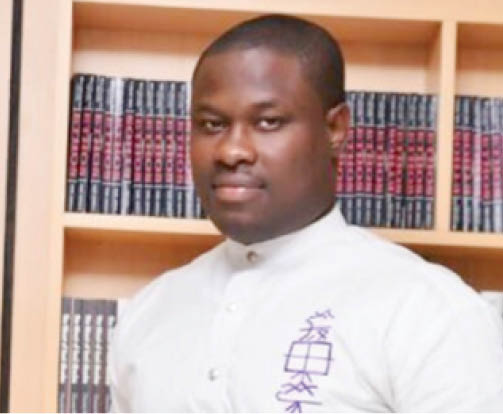Tunde Leye ‘resurrects’ Afonja in historical fiction
Title: Afonja: The Rise Author: Tunde Leye Publisher: TLS Place/Masobe Pages: 354 Reviewer: Nathaniel Bivan Warning: I will be doing something I rarely do in reviews and start with what I absolutely hate about this book. For weeks, Afonja, Alimi, Toyeje, the Bashorun, Abiodun, and several other characters in this novel have kept me company. […]

Tunde Leye
Title: Afonja: The Rise
Author: Tunde Leye
Publisher: TLS Place/Masobe
Pages: 354
Reviewer: Nathaniel Bivan
Warning: I will be doing something I rarely do in reviews and start with what I absolutely hate about this book. For weeks, Afonja, Alimi, Toyeje, the Bashorun, Abiodun, and several other characters in this novel have kept me company. There are also daring women like Labake and Abike. But we will come to that later.
I honestly hate the unconventional font size of this book. Aside the fact that it’s unusual for a novel, it may appear deceptive to readers who love hefty works. So, the moment I turned the first few pages, I was upset and complained bitterly. One, because I think the theme explored is important, and secondly, because it’s a very brave effort. Also, I didn’t like the fact that there aren’t traditional paragraphs. For me, a book is a book and should never be turned into the internet that it certainly isn’t. That said, let’s get right into it. 
The cover design of ‘Afonja: The Rise’ is intriguing for one singular reason: the depiction of a man with traditional Yoruba marks on his cheek. When I first saw this, I knew instantly I wanted to find out more. Then I noticed the arrows in the background. Instantly, pictures of ancient wars popped up in my mind and I was already very expectant.
When the Oyo Mesi, elders saddled with the responsibility of advising the Alaafin (king of the Oyo Empire) meet in secret to hatch a plan, they have no inkling as to how their decision will negatively influence the future of the empire. They plot to anoint a king, who they presume, they can control. How wrong they are.
Godfatherism, cabals, name them, didn’t start during the era of former president Goodluck Jonathan or President Buhari, this book reminds. Men, and even women in the corridors of power have the tendency to influence, manipulate and monopolise power from behind the scenes. In this novel, it begins with the Oyo Mesi, of which two men stand out, Woruda and Bashorun Asamu. When they get their wish, and install the youthful Aole Arogangan, they realise too late their grievous error in judgement. The young man listens more to his wife, Labake, than any living being. And this listening ear he has for her pitches the two strongest army commanders, Afonja and Toyeje, against each other.
In today’s democracy, when a president or governor in Nigeria takes oath of office, he remains tied to those who facilitated his ascension to power. So, he begins to dish out positions of authority to such persons or hands them juicy contracts as a show of appreciation, or perhaps, as a result of a previous agreement. When he doesn’t do this, a battle line is drawn and they are likely to become his chief critics. This is what sets Afonja and Toyeje against each other. Instead of bowing to the wishes of his kingmakers, and giving the office of Aare Ona Kakanfo to Afonja, Aole intentionally hands it to Toyeje to cripple the elders’ control over the kingdom. This is what opens the empire to war and the thirsty ambition of foreigners, such as Alimi, a northerner and a jihadist who aims to establish Islam in Yoruba land.
A major incident sets the stage and makes a reader sympathetic to the northerner’s in the empire. One, they are all slaves, except for Alimi. And one slave, Abudu, is treated terribly by Afonja’s brother who later becomes a traitor to his brother. This is one trait of the plot that makes me fall in love with the book. The fact that, an unlikable character, turns out to be less so.
Bringing characters to life is, arguably, one of the greatest challenges in writing fiction. In this book, some pop out of the pages, and you see their angry faces and pride. Aole, for example, is youthful, somewhat irrational and impulsive. Afonja is calculating, strong and firm. Toyeje is proud, temperamental, but also realistic, a valuable mix. Asamu, like Afonja, is calculating, while Woruda is cunning and analytical. This list will not be complete without the patient and master strategist, Alimi. If the Oyo Empire crumbles, he stands to gain the most. But what will it take to achieve this?
Two women, Abike and Labake, play huge roles in this world of men. Abike, Alaafin Aole’s wife, wields power through her husband. She is his hatchet woman from the very beginning, (when he isn’t Alaafin) when she severs the tongue of a slave for going against her husband. Cunning and manipulative, she singlehandedly influences every one of her husband’s major decisions. Whether they help him and the kingdom triumph is a different matter altogether. Labake comes in strongly much later, but her influence and wisdom shake the kingdom in an unimaginable manner.
If you are one for action and suspense, ‘Afonja: The Rise’ has both ingredients. Also, Leye’s plot flows nicely till the very end, and Yoruba words like the ‘kobi’ gives the novel a ring that sets it apart as one of those books you never forget. Typos aside, this is arguably the boldest historical fiction from a Nigerian writer in a while.
I can’t help but wonder, is there a sequel?
